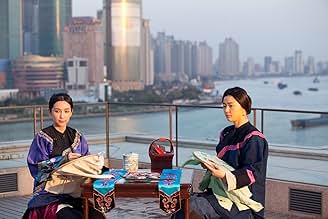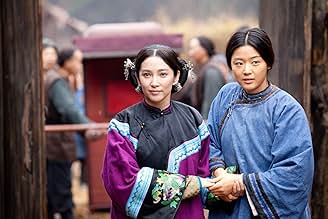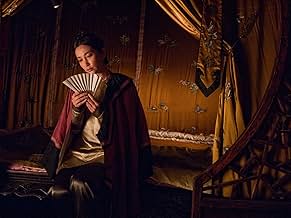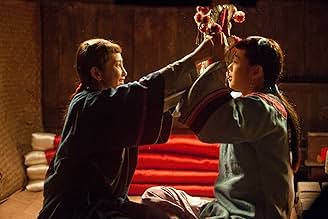IMDb-BEWERTUNG
6,1/10
4114
IHRE BEWERTUNG
Füge eine Handlung in deiner Sprache hinzuA story set in nineteenth-century China and focusing on the life-long friendship between two girls who develop their own secret code as a way to contend with the rigid social norms imposed o... Alles lesenA story set in nineteenth-century China and focusing on the life-long friendship between two girls who develop their own secret code as a way to contend with the rigid social norms imposed on women.A story set in nineteenth-century China and focusing on the life-long friendship between two girls who develop their own secret code as a way to contend with the rigid social norms imposed on women.
- Auszeichnungen
- 3 Gewinne & 1 Nominierung insgesamt
Jun Ji-hyun
- Snow Flower
- (as Gianna Jun)
- …
Hu Qing Yun
- Mrs. Liao
- (as Jingyun Hu)
Shiping Cao
- Mr. Wei
- (as Shi Ping Cao)
Empfohlene Bewertungen
One of the key discoveries in my life is that for me and for many of my women friends, our friendship is often the most wonderful gift of life. This movie celebrates friendship among women. It relates two stories of women in China whose friendship is signed as a contract, a laotong. Laotong, the movie explains, is a life-long relationship between women, often considered more important than marriage. The movie presents two young friends in Shanghai in the 21st century who celebrate a laotong. Their friendship is portrayed with the closeness, empathy and support that is well known about friendship among women. And it also presents the difficulties and distances that are very real and perhaps unavoidable in close relationships. In a similar way, the movie presents two 19th century women who had had a laotong in very different circumstances and for whom the friendship is also both a marvelous gift and a difficult relationship. Movies are often about relations between a man and a women but seldom about women friends. That is why this movie seems to be controversial. It is not always accepted that for women their women friends are their most rewarding relationships despite the complicated faces of any human partnership. Go see the movie. It shows a side of women's life that is amazingly real but poorly understood.
Sunflower and the Secret Fan is the poignant tale of two 21st century Asian girls and their matches in the 19th century: Both couples are bound by the dictates of a patriarchal culture that challenges the natural love and devotion they feel for each other. These lady laotongs or "old sames" take an oath to make them faithful sisters forever, the outward show of an enduring, lifelong commitment to their sisterhood.
Director Wayne Wang's challenge is to intercut the centuries and women without confusing the audience, a virtue not always achieved in two hours of traversing between times. His limited success can be attributed to the striking skyline of modern Shanghai, an apt metaphor for the change in the ladies' lives, indeed for change itself.
Just as arresting as the visual images is the stringed music of Rachel Portman, which dictates emotions as strongly as any other score I have heard this year. Some might complain of manipulation; I enjoy the excess as if it were an ancient Chinese fan of innumerable design. BTW, the titular fan was used by the 19th century ladies to make messages to each other in their special language. Wang's considerable success showing devoted friends in Joy Luck Club is evidenced in the ladies here.
The bonding of protagonists is strong on the surface, but because there is so much to do in only 2 hours, we never have sustained conversation among them to verify what we intuit without much dialogue. It would be sweet to linger more with them while they show through dialogue the bond that makes them sacrifice for each other throughout their lives.
Snow Flower and the Secret Fan in the end turns on love, its many forms and demands and on change, which frequently derails the best intentions of love itself. The ladies here evidence in delicate ways the tumult and reward accompanying a lifelong commitment to another human being. And that's no secret.
Director Wayne Wang's challenge is to intercut the centuries and women without confusing the audience, a virtue not always achieved in two hours of traversing between times. His limited success can be attributed to the striking skyline of modern Shanghai, an apt metaphor for the change in the ladies' lives, indeed for change itself.
Just as arresting as the visual images is the stringed music of Rachel Portman, which dictates emotions as strongly as any other score I have heard this year. Some might complain of manipulation; I enjoy the excess as if it were an ancient Chinese fan of innumerable design. BTW, the titular fan was used by the 19th century ladies to make messages to each other in their special language. Wang's considerable success showing devoted friends in Joy Luck Club is evidenced in the ladies here.
The bonding of protagonists is strong on the surface, but because there is so much to do in only 2 hours, we never have sustained conversation among them to verify what we intuit without much dialogue. It would be sweet to linger more with them while they show through dialogue the bond that makes them sacrifice for each other throughout their lives.
Snow Flower and the Secret Fan in the end turns on love, its many forms and demands and on change, which frequently derails the best intentions of love itself. The ladies here evidence in delicate ways the tumult and reward accompanying a lifelong commitment to another human being. And that's no secret.
SNOW FLOWER AND THE SECRET FAN is the cinematic adaptation of Lisa See's popular novel by writers Angela Workman, Ron Bass and Michael K. Ray and director Wayne Wang. The film unveils parallel stories between 19th century China and present day Shanghai - the tales of two women joined by laotong - a binding vow and contract to be eternal friends and share each others lives - communicating with a secret women's language called nu shu, carefully inked characters placed on the folds between the spines of a silken fan. By using the same actresses to play the parts of the girls two centuries apart adds a mysterious beauty to the films alluring flavor.
In 1826 Lily and Snow Flower become laotung and though they are from opposite ends of the social stratum they become devoted friends, undergoing the ritual of having their feet broken and bound to remain very small as adults - apparently a desired attribute for physical attraction as a potential bride. The poor girl is chosen for marriage by a wealthy family and the rich girl is promised to a butcher, an extreme reversal of roles in society and it is the manner in which each adapts and aids the other that demonstrates the depth of the bond of laotong. Concurrently in the film we meet Nina and Sophie in contemporary Shanghai: Nina has gained education and stature and is due to move to New York as part of an important business. Sophie is in an accident and only slowly do we realize that Sophie had the promise of moving to Australia to marry an Aussie singer (Hugh Jackman), more because she is pregnant than for love. Because of the laotung between Nina and Sophie the two make sacrifices that overcome all else to prove their loyalty. There are many parallels in the two stories that show a bond between the two sets of girls and to capture this bond securely the two girls form centuries apart are played by the same actresses: Lily/Nina become the roles of Bing Bing Li and Snow Flower/Sophie are portrayed by Gianna Jun. The supporting cast is carefully chosen and uniformly fine.
The sets and costumes and music enhance this film significantly. It is not a great epic of a movie, but it has a tender and touching story that is very well told by everyone involved.
Grady Harp
In 1826 Lily and Snow Flower become laotung and though they are from opposite ends of the social stratum they become devoted friends, undergoing the ritual of having their feet broken and bound to remain very small as adults - apparently a desired attribute for physical attraction as a potential bride. The poor girl is chosen for marriage by a wealthy family and the rich girl is promised to a butcher, an extreme reversal of roles in society and it is the manner in which each adapts and aids the other that demonstrates the depth of the bond of laotong. Concurrently in the film we meet Nina and Sophie in contemporary Shanghai: Nina has gained education and stature and is due to move to New York as part of an important business. Sophie is in an accident and only slowly do we realize that Sophie had the promise of moving to Australia to marry an Aussie singer (Hugh Jackman), more because she is pregnant than for love. Because of the laotung between Nina and Sophie the two make sacrifices that overcome all else to prove their loyalty. There are many parallels in the two stories that show a bond between the two sets of girls and to capture this bond securely the two girls form centuries apart are played by the same actresses: Lily/Nina become the roles of Bing Bing Li and Snow Flower/Sophie are portrayed by Gianna Jun. The supporting cast is carefully chosen and uniformly fine.
The sets and costumes and music enhance this film significantly. It is not a great epic of a movie, but it has a tender and touching story that is very well told by everyone involved.
Grady Harp
This is a well cast and nicely filmed but uneven movie. The 2 leads Li Bing Bing and Gianna Jun are lovely in different ways. Only Asian actresses could play the same characters as teens and in their 30s convincingly.
The story concerns two pairs of best girl friends, one set in present day and one pair set in the mid 1800s in China. The modern story is a bit less interesting than the modern one. The 1800s story has bound feet (ouch), civil war and rural poverty. The modern story is about career and love with a foreigner (an unintentionally hilarious Hugh Jackman - that song!).
The changes between the 2 stories are a bit too frequent. It isn't confusing about who is who but it just breaks up and jumbles the narrative a little too much.
The movie is a bit long and maudlin. With too many lingering sad looks. Feel like shouting Hurry Up sometimes! That is the old fashioned Chinese soap opera part of it.
Overall worth one watch.
The story concerns two pairs of best girl friends, one set in present day and one pair set in the mid 1800s in China. The modern story is a bit less interesting than the modern one. The 1800s story has bound feet (ouch), civil war and rural poverty. The modern story is about career and love with a foreigner (an unintentionally hilarious Hugh Jackman - that song!).
The changes between the 2 stories are a bit too frequent. It isn't confusing about who is who but it just breaks up and jumbles the narrative a little too much.
The movie is a bit long and maudlin. With too many lingering sad looks. Feel like shouting Hurry Up sometimes! That is the old fashioned Chinese soap opera part of it.
Overall worth one watch.
Snow Flower parallels two friendships, but not very well. The older story of two girls that both had bound feet and by lautong is rich - but the film has trouble translating it into the modern day story.
Wusstest du schon
- WissenswertesRupert Murdoch personally asked Fox Searchlight to release this film in North America.
- PatzerThe last paragraphs of the unsent letter that Nina found in Sophias apartment, which can be seen when she closes the notebook, don't match Nina's voice-over.
- VerbindungenReferenced in Conan: A Tree with Dutch Elm Disease Grows in Brooklyn (2011)
Top-Auswahl
Melde dich zum Bewerten an und greife auf die Watchlist für personalisierte Empfehlungen zu.
- How long is Snow Flower and the Secret Fan?Powered by Alexa
Details
- Erscheinungsdatum
- Herkunftsländer
- Offizieller Standort
- Sprachen
- Auch bekannt als
- Snow Flower and the Secret Fan
- Drehorte
- Produktionsfirma
- Weitere beteiligte Unternehmen bei IMDbPro anzeigen
Box Office
- Budget
- 6.000.000 $ (geschätzt)
- Bruttoertrag in den USA und Kanada
- 1.348.205 $
- Eröffnungswochenende in den USA und in Kanada
- 134.005 $
- 17. Juli 2011
- Weltweiter Bruttoertrag
- 11.348.205 $
- Laufzeit1 Stunde 44 Minuten
- Farbe
- Sound-Mix
- Seitenverhältnis
- 2.35 : 1
Zu dieser Seite beitragen
Bearbeitung vorschlagen oder fehlenden Inhalt hinzufügen


































